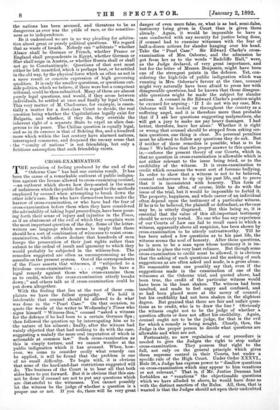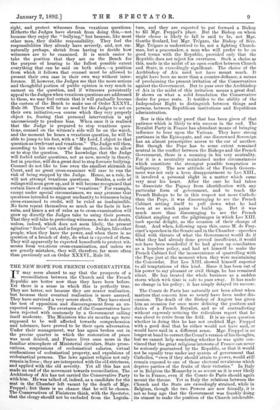CROSS-EXAMINATION. T HE revulsion of feeling produced by the end of
the " Osborne Case " has had one curious result. It has been the cause of a remarkable outburst of public indigna- tion against the license allowed to cross-examining counsel, —an outburst which shows how deep-seated is the sense of unfairness which the public feel in regard to the methods .employed by counsel when attempting to break down the other side's case. Men who have themselves been under the harrow of cross-examination, or who have had the fear of - cross-examination before them when they have considered the advisability of taking legal proceedings, have been pour- ing forth their sense of injury and injustice in the Times, as if an abatement of the evil of which they complain were the most important question of the day. Some of the letter- writers use language which seems to imply that there should be a sort of combination of witnesses to resist cross- examination, while others declare that hundreds of men forego the prosecution of their just rights rather than submit to the ordeal of insult and ignominy to which they would probably be subjected in the witness-box. The remedies suggested are often as uncompromising as the assaults on the present system. One of the correspondents of the Times asserts that witnesses, if "subjected to a frivolous cross-examination ought to have a legal remedy against those who cross-examine them as to credit, where the cross-examination utterly breaks down ;" and others talk as if cross-examination could be put down altogether. With the feeling that lies at the root of these com- plaints we have the fullest sympathy. We hold it intolerable that counsel should be allowed to do what was done in the " Pearl Case." On that occasion, to quote the words of the writer to Wednesday's Times who • signs himself " Wituess-Box," counsel "asked a witness for the defence if he had been to a certain German Spa ; • then followed the question up by interrogating him as to -'the nature of his ailment ; finally, after the witness had vainly objected that that had nothing to do with the case, suggesting a malady the mere oral imputation of which is actionable at common law." Such cross-examination as this is simply torture, and we cannot wonder at the public indignation which it has aroused. When, how- ever, we come to consider coolly what remedy can be applied, it will be found that the problem is one of no small difficulty. To begin with, it is obvious that none of the hard-and-fast restrictions suggested will do. The business of the Court is to hear all that both sides have to put forward. But it is obvious that this can- not be done if counsel are not to put any questions which are distasteful to the witnesses. You cannot possibly let the witness be the judge of whether a question is a proper one or not. If you do, there will be very great danger of even more false, or, what is as bad, semi-false, testimony being given in Court than is given there already. Again, it would be impossible to have a case conducted with any security for justice being done, if counsel had to examine witnesses with the fear of half-a-dozen actions for slander hanging over his head. Take the " Pearl Case Sir Edward Clarke's cross- examination of Mrs. Osborne, and the admission he got from her as to the words " Radcliffe Hall," were, as the Judge declared, of very great importance, and but for the letter of Messrs. Benjamin, might have been one of the strongest points in the defence. Yet, con- sidering the high-tide of public indignation which was running in Mrs. Osborne's favour at the time, counsel might very naturally have been afraid to press her with disagreeable questions, had he known that those disagree- able questions might be made the subject for slander actions. A counsel in Sir Edward Clarke's position might be excused for arguing : If I do not win my case, Mrs.
Osborne will be looked on throughout the country as a suffering angel, and it is therefore more than probable that if I ask her questions suggesting malpractices, she will get a jury to make me pay heavy damages. I had better, therefore, leave her alone.' Whether it is right or wrong that counsel should-be stopped from asking cer- tain questions, one thing is clear. No personal penalties must be allowed to follow any questions they do ask. But if neither of these remedies is possible, what is to be done ? We believe that the proper answer to this question is,—enforce the present theory of our Courts, which is, that no question in cross-examination is allowable which is not either relevant to the issue being tried, or to the credibility of the witness. It is cross-examination to credit which occasions the worst sort of forensic bullying.
In order to show that a witness is not to be believed, counsel endeavours to rip up his past life, and to prove that it is inconsistent with honesty. This form of examination has often, of course, little to do with the issue of the trial, but it would be impossible to forbid it. The property, happiness, and whole career of an individual often depend upon the testimony of a particular witness. If he is to be believed, the plaintiff or defendant, as the case may be, is utterly disgraced. But this being so, it is essential that the value of this all-important testimony should be severely tested. No one who has any experience of our Courts of Law can fail to recall cases in which a witness, apparently above all suspicion, has been shown by cross-examination to be utterly untrustworthy. Till he has been asked a few questions as to his past life, the witness seems the soul of honesty. After these questions, he is seen to be a man upon whose testimony it is im- possible to place the very least reliance. But though some cross-examination to credit must be allowed, it is obvious that the asking of such questions and the making of such suggestions as are often asked and made, is a gross abuse. No reasonable man can possibly say that, even if the suggestions made in the examination of one of the witnesses at the Osborne trial, and quoted above, had been true, the credit of the particular witness would have been in the least shaken. The witness had been insulted, and made to feel angry and confused, and so had been placed more at the mercy of counsel ; but his credibility had not been shaken in the slightest degree. But granted that there are fair and unfair ques- tions as to credit, who is to draw the line ? Obviously the witness ought not to be the judge of whether a question affects or does not affect his credibility. Again, counsel ought not to be the judge, for that is the evil for which a remedy is being sought. Clearly, then, the Judge is the proper person to decide what questions are allowable and what are not.
Fortunately, no new regulation of our procedure is needed to give the Judges the right to stop unfair cross-examination. They possess that right to the full, not only on the general principle which gives them supreme control in their Courts, but under a specific rule of the High Court. Under Order XXXVI., Rule 38, a Judge has express power to " disallow questions on cross-examination which may appear to him vexatious or not relevant." That is, if Mr. Justice Denman had forbidden as " vexatious " the objectionable questions which we have alluded to above, he would have done so with the distinct sanction of the Rules. All, then, that is wanted is that the Judges should act upon their undoubted right, and protect witnesses from vexatious questions. Hitherto the Judges have shrunk from doing this,—not because they enjoy the " bullying," but because, like most other men, they dislike responsibility. They feel the responsibilities they already have severely, and, not un- naturally perhaps, shrink from having to decide how witnesses are to be examined. It is much easier to take the position that they are on the Bench for the purpose of hearing to the fullest possible extent everything that can be said on both sides,—a position from which it follows that counsel must be allowed to present their own case in their own way without inter- ference. If, however, the Judges see that the more serious and thoughtful portion of public opinion is very much in earnest on the question, and if witnesses persistently appeal to the Judges when vexatious questions are addressed to them, we may feel certain that it will gradually become the custom of the Bench to make use of Order XXXVI., Rule 38. There will be no need for the Judges to act on their own initiative,—a course which they very properly object to, fearing that personal intervention is apt unconsciously to produce bias. When once it is realised that the Judge is prepared to stop vexatious ques- tions, counsel on the witness's side will be on the watch, and the moment he hears a vexatious question, he will be able to jump to his feet, with a " My Lord, I object to that question as irrelevant and vexatious." The Judge will then, according to his own view of the matter, decide to allow or to stop the question. The knowledge that the Judge will forbid unfair questions, not as now, merely in theory, but in practice, will do a great deal to stop forensic bullying. Counsel do not like to lose even the smallest skirmish in Court, and no great cross-examiner will care to run the risk of being stopped by the Judge. Hence, as a rule, he will not attempt vexatious questions. Besides, a code of rulings will soon grow up, and it will become recognised that certain lines of examination are "vexatious." For example, except under special circumstances, we may presume that questions intended to suggest unchastity to witnesses being cross-examined to credit, will be ruled as inadmissible. No facts repeat themselves so much as the facts in law- suits, and hence a set of rules as to cross-examination will grow up directly the Judges take to using their powers. That they will take to protecting witnesses, we do not doubt, unless, indeed, which does not seem likely, the present agitation " fizzles " out, and is forgotten. Judges, like other people, when they have the power, and when there is no question of a breach of duty, do what is expected of them. They will apparently be expected henceforth to protect wit- nesses from vexatious cross-examination, and unless we are greatly mistaken, they will, therefore, far more often than previously act on Order XXXVI., Rule 38.















































 Previous page
Previous page